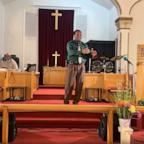Response Times Vary for In-Hospital Heart Attacks
Aug. 1 -- FRIDAY, July 31 (HealthDay News) -- Quick defibrillation can increase the chances of survival for hospital patients who have cardiac arrest, but sometimes the treatment is not quick enough and a new study has found that the delays are not due to overloaded or undereducated staff.
Defibrillation is a process in which an electronic device gives the heart an electric shock. This helps restore normal contraction rhythms in a heart having dangerous arrhythmia or in cardiac arrest. The American Heart Association recommends that defibrillation be performed within two minutes of cardiac arrest. The longer the delay, the less chance the patient has of surviving.
Previous studies have linked delays to other factors, such as being admitted to the hospital for something other than heart problems or having cardiac arrest at night or on weekends.
But in this study, experts analyzed records from 7,479 adult in-patients with cardiac arrest at 200 U.S. hospitals. The hospitals completed a detailed survey that included information about the location, hospital teaching status, number of patient beds and the availability of automatic external defibrillators.
The rates of delayed defibrillation -- a delay being longer than two minutes -- varied from 2.4 percent to more than 50 percent between hospitals, according to the report in the July 27 issue of Archives of Internal Medicine.
Differences between hospitals accounted for a great deal of the variation, the researchers found. In one example, patients with identical characteristics had a 46 percent higher chance of having a delayed defibrillation at one hospital compared with another.
Patients at hospitals with fewer defibrillation delays were less likely to die in the hospital. The odds of survival were 41 percent higher in the 25 percent of hospitals with the lowest rates of delays when compared with the 25 percent of hospitals with the most delays, according to the study.




